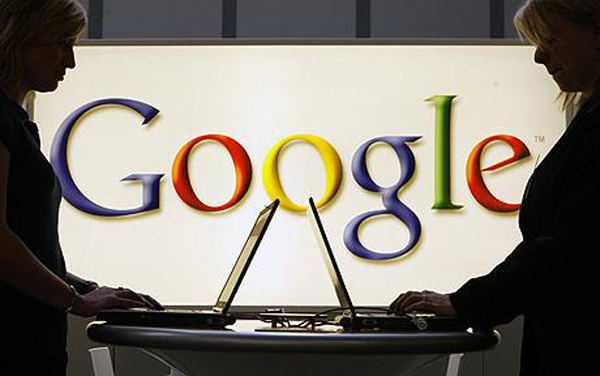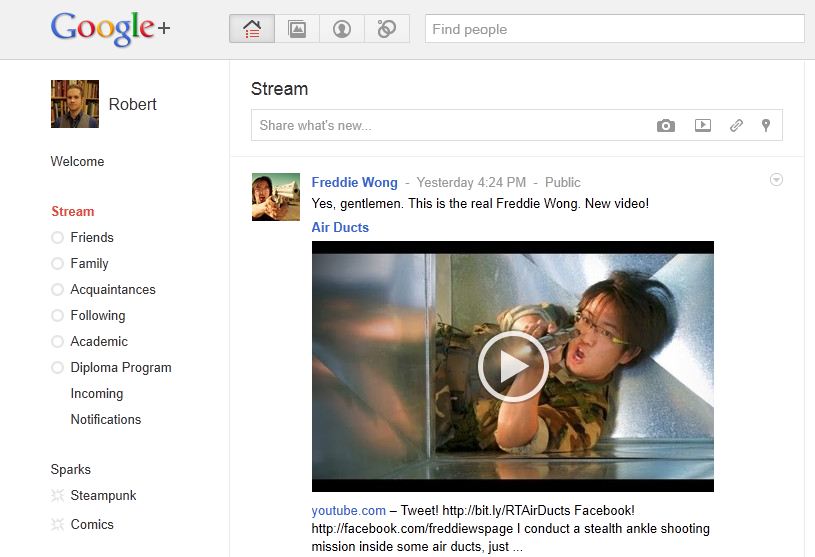Google+ is a bit boring. Time to fix that!
About a month ago, I wrote a post on why I thought people might ditch Facebook to join Google+. I based that article on what I had read about the new “social tool” up to that point. Every hands-on and product overview talked about the intuitiveness of the Circles feature, the smoothness of Hangouts and the clean layout of the destination itself. About a week later, I accepted an invite from a friend to join Google+, promptly built a profile and sought out people I knew. It seemed kind of cool at first – I was in on the ground floor of a new social experience.
But then - nothing. I’ve linked up with about fifty people, but it doesn’t seem like any of them are really using Google+ to the degree that they’re using Facebook. As a result, I don’t feel compelled to share much on the service. Now I’m thinking that Google+ has become a bit of a “wait and see” social networking option – at least for me.
It’s too bad, really, considering what Google+ is offering users. I waxed poetic in my previous article about how users can organize their contacts into specific Circles, allowing them to share content with people based on mutual connections. The oft-cited example is keeping your boss from seeing the pictures from last night’s party. Meanwhile, the video-chat app, Hangouts, was innovative enough to spur Facebook into partnering with Skype to create their own version. Despite these better options, it appears that Facebook is too heavily ingrained in our online lives. For some unconscious reason, we’re afraid to move on to a platform that could be both bigger and better.
I’m just as guilty of this as anyone. When I write a new blog post, I’ll always fire off a post on Facebook first, because I know the majority of my contacts are still there. It’s partially a force of habit: I’m so used to only having Facebook that I sometimes forget to click over to Google+ and publicize there, as well. Unfortunately, the low volume of activity on my Google+ Stream is only exacerbating this phenomenon. Few of my contacts are posting anything, whether in their own feed or in response to the material I’m posting, so I’m increasingly less likely to post anything, either.
Even the YouTubers I follow on Google+ don’t seem to be getting much out of it – personalities like Toby Turner, Philip DeFranco and Freddie Wong will often link to their latest videos on YouTube, but that will be the extent of their activity. When it comes to YouTubers, you actually get a far deeper connection with them (even as fans) on sites like Twitter or Facebook.
I mused about how this would all play out in my last post on Google+, and it looks like my prediction has been disproved: a significant number of people fear joining the new site. I thought it might come down to a black-and-white Facebook vs. Google+ battle royale, and the reality is fuzzier: very few have completely abandoned Facebook in favour of Google+, and those who are on the new site (at least the ones I know) are comfortable keeping Facebook as their main social network, staying on Google+ just to try it out.
The fear of either leaving Facebook or maintaining two parallel accounts – Google+ and Facebook at once – is much like having to change to a new school. You’re apprehensive about who you’ll meet, and how it will be different from the place you know. This comparison also applies to users’ early exploration of Google+: they want it to operate in way they’re comfortable with. Users will immediately want a sizeable friend list, a familiarity with the layout and a knowledge of the nuances of the site. Google+ can’t offer any of that at the moment, and so I’ve seen quite a few users declare their dislike of the Google+ soon after signing up.
If it sounds like I’m still defending Google+, that’s because I want to see it do well. Even though my time on the site at the moment is fairly dull, I hesitate to set all my guns a-blazing against Google+ before it has had time to grow. It’s a fascinating thing to watch, actually: Google+ is developing under far more intense scrutiny than Facebook did when it launched. Way back in 2004, Facebook was just a little start-up, and we could not predict how ubiquitous social networks have become, with Facebook as the flagship service. It has created a whole raft of expectations for Google+, which much be met and exceeded if the newcomer is going to have an impact.
That is why I believe we’re currently experiencing on Google+: the product of seven years with one social network. The growing pains of Google+ could be described as a colossal “Facebook redesign” complaint, writ large: instead of creating groups like “1,000,000 Strong Against the New Facebook”, we’re collectively pulling back from the shock of entering a new online community. We try to use Google+ like we use Facebook: posting things to all our Circles at once, or wishing we had all our contacts signed up. (Check out this recent Gizmodo article on how to use Google+)
Google+ can’t be a “better Facebook” until we go back and start using it the way we used Facebook back in the day: we messed around, deciding on the “etiquette” of the site, and tried to make it match the way we wanted to interact. Google wants us to build a better version of Google+ by doing that once again.
How? Use your Circles. Figure out who your real friends are, and divide everyone else up based on how you know them. When you post, ask yourself which Circles the post applies to – don’t simply share with everyone because that’s the way Facebook works. If you see something you “like” online, click the +1 button, too (they even have it on Google search results). It’s not hard to make Google+ into a fun, fulfilling experience – but we first might have to forget how Facebook works. Don’t worry - Facebook will still be there to welcome you back if you really hate your “new school”.
-
If you’ve been poking around Google+, what do you think of it so far? Are you embracing it whole-heartedly, or has it already lost its lustre? If you haven’t gotten an invite yet, do you think you’ll join up if you get the chance? Hit up the comments section to leave your thoughts, and don’t forget to browse through some of my other Internet-related articles:
Rebecca Black and the culture of Internet hate
The double-edged sword of tabbed browsing
If that's not enough shameless self-promoting, you can also follow me on Twitter!







